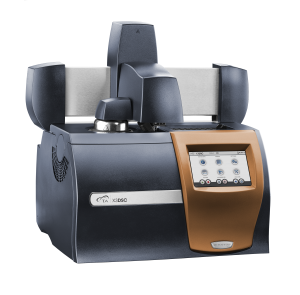What is Differential Scanning Calorimetry?
Gray Slough
February 7, 2022
Differential scanning calorimetry is an analytical technique used to measure the amount of heat released or absorbed by a sample during heating or cooling over a range of temperature. As well as being used to characterize the thermal properties of a material, a differential scanning calorimeter is used to determine the temperature at which particular phase transitions occur, including glass transition temperature, fusion and crystallization events.

Differential Scanning Calorimetry
Performing differential scanning calorimetry experiments requires the use of an instrument that can supply the desired temperature range for testing and monitor temperature and heat flow changes very precisely.1
Heat flux instruments for differential scanning calorimetry have a furnace in which both a sample and a reference material are placed. Samples are encapsulated in metal, typically aluminum, pans, and the reference material is usually an empty pan. The furnace is heated or cooled to see how the heat flow properties change as a function of temperature . Quantitative heat flow information can be determined from the measured temperature difference between the sample and reference.
Differential Scanning Calorimetry (DSC) Applications
There is a wide range of applications for differential scanning calorimetry across chemistry, biochemistry, cell biology, pharmacology, nanoscience, and other fields.1 Polymers are commonly analyzed with differential scanning calorimetry to determine their thermal transition points, including the glass transition, crystallization and melting temperatures. Often these thermal transitions will determine the operational range over which a polymer can be expected to perform to a certain specification. A polymer’s processability and performance are both influenced by rheological properties, and thus rheological measurements can also provide vital information to optimize polymer structures.
Pharamceutical materials can also fruitfully be studied by DSC. Questions, such as the existence of polymorphs, structure changes over time, amorphous content and drug-excipient compatibility can be examined. The resulting data can have impacts on bio-availability of the drug, processing conditions, storage and shelf-life. In many cases, only small amounts of material are available and so having a very sensitive DSC is critical.
Differential Scanning Calorimetry (DSC) Instrumentation
TA Instruments offers an extensive range of differential scanning calorimetry instruments. These all incorporate TA Instruments’ patented Tzero™ DSC technology, giving you an unparalleled level of precision in determining heat flows in your differential scanning calorimetry experiments. Not only does this technology offer enhanced accuracy and precision, but it also improves experiments’ baseline flatness, and thus transition resolution and sensitivity.
Compatible with a wide range of sample types, from polymeric materials to biological samples, differential scanning calorimetry equipment from TA Instruments is being used by a number of researchers to support their work, including challenging tasks such as the development of new electrolytes.3 Some instruments in our offering, such as the Multi-Sample X3 DSC, can measure up to three samples simultaneously, helping accelerate your workflows with no sacrifice on the quality of the measurements.
TA Instruments has designed calorimetry software to provide an exceptional user experience. DSC software includes advanced packages for instrument control and data analysis that can perform automated calibration routines and incorporate multiple calibration sets.
All routines can be customized if necessary to provide the flexibility many research instruments require, or for fine optimization of industrial workflows. All standard differential scanning calorimetry analyses are included with the instrument, and more advanced features, temperature modulated DSC, are also available.
Contact TA Instruments today to discover how our differential scanning calorimetry instruments make measuring even your most complex thermal events easy.
References:
- Gill, P., Moghadam, T. T., & Ranjbar, B. (2010). Differential Scanning Calorimetry Techniques: Applications in Biology and Nanoscience. Journal of Biomolecular Techniques, 21(4), 167–193.
- TA Instruments (2021), Electrolyte Researchers Work to Creatively Solve Energy-Related Challenges, https://www.tainstruments.com/electrolyte-researchers-work-to-creatively-solve-energy-related-challenges-sign-up/, accessed January 2022
Other Resources
- Applications Note – Thermal Analysis of Food Coloring Material by DSC
- Applications Note – TA Instruments Discovery DSC X3: Three-fold Improvement in the Efficiency of the Nonisothermal Crystallization Kinetics Experiment
- Webinar – Advancements in the Characterization of Pharmaceuticals by DSC
- Webinar –Polymer Analysis Using the New Multi Sample Discovery X3 DSC
- Webinar – Pharmaceutical Characterization with the New Multi Sample Discovery X3 DSC
- Webinar – Discover the Possibilities with the New Multi-Sample Discovery X3 Differential Scanning Calorimeter
- Webinar – DSC Characterization of Crystalline Structure in Foods and Pharmaceuticals
- Instrument – Multi-Sample X3 DSC
- Instrument – DSC 2500
- Contact – Contact TA Instruments Today

